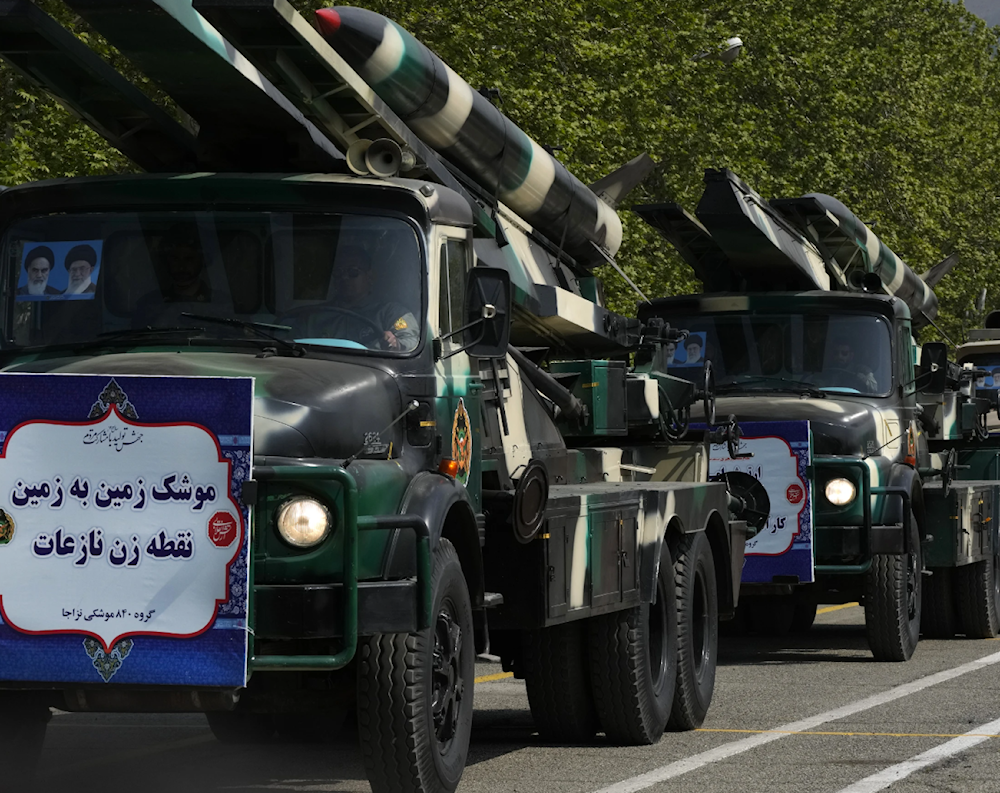'Israel', US admit misjudging outcomes of strike on Iran's consulate
Even when it became evident that Iran would react, US and Israeli officials first believed the extent of the retaliation would be relatively modest.
-

Missiles are carried on trucks during the Army Day parade at a military base in northern Tehran, Iran on April 17, 2024. (AP)
Israeli officials said they did not perceive a hit to the Iranian consulate as a provocation and did not notify Washington about it until just before it occurred, The New York Times reported.
Numerous American officials who were involved in high-level conversations following the strike reported that the Israelis made a huge mistake in believing that Iran would not react aggressively. A top Israeli official also agreed with this assessment.
The unprecedented retaliation demonstrated that the unwritten rules of engagement in the long-running war between "Israel" and Iran had shifted dramatically in recent months, making it more difficult than ever for either side to predict the other's intentions and behavior.
Israeli media previously reported that Iran's threat of retaliation had left "Israel" paralyzed with fear.
Even when it became evident that Iran would react, US and Israeli officials first believed the extent of the retaliation would be relatively modest, before hurrying to change their judgment many times. Now the question is what "Israel" will do next – and how Iran will respond this time.
Read more: UN, West inaction on 'Israel' pushed Iran to retaliate, Raisi says
Two Israeli sources indicated that planning for the Israeli assault in Syria began two months ago. Mohammad Reza Zahedi, Iran's special al-Quds Force commander for Syria and Lebanon, was the intended target.
The Israeli war cabinet approved the action about a week earlier, on March 22, according to internal Israeli military papers obtained by The New York Times that outlined the strike's preparations. The IOF did not respond to the internal assessment.
These documents also indicated the spectrum of Iranian countermeasures that the Israeli government anticipated, including small-scale strikes by the Axis of Resistance and a small-scale Iranian strike. None of the estimates expected the intensity with which Iran responded.
Israeli intelligence at first expected no more than 10 surface-to-surface missiles, in an offensive codenamed "Late Foliage". Afterward, they uncovered that Iran had grander plans, revising their estimate to 60 or 70 missiles, which was still too low.
US Secretary Lloyd J. Austin protested directly to "Israel's" Security Minister, Yoav Gallant, during a phone call on April 3, according to US sources, corroborating an earlier account by The Washington Post.
Austin stated that the attack put US troops in the region at risk and that the lack of warning gave them no time to strengthen their defenses, while Gallant made no immediate reaction.
Majority of Israelis want to de-escalate tensions after Iran strike
This comes as the majority of Israelis (52%) believe that an immediate response to Iran's retaliatory strike is not desired, but rather prefer "to close the current round of hostilities," a recent poll conducted by the Hebrew University of Occupied al-Quds revealed, as reported by the Financial Times.
"Everyone is on board with the [Gaza war] goals. But we see a very different path here" with Iran, Nimrod Zeldin, who conducted the study, told FT. "Iran is more complicated."
According to the report, the clear-cut split is reflected in the "tortuous" debate within the war cabinet led by Prime Minister Netanyahu. Experts argue that the window for an immediate response is closing further as time passes.
One Israeli source informed the Financial Times that the regime has "in principle" taken a decision to respond. "But the timing and scope of such an operation remain unknown," the report says, noting that international pressure from allies, namely the US and the UK, is causing further delay.
This lack of a "clear signal" from the war cabinet has left the public "in limbo," with daily life returning to "an uneasy semblance of wartime normalcy." For instance, just two days after the Iranian response, tens of thousands of people attended an open-air concert in "Tel Aviv" on Tuesday. But the army warned that restrictions can be reimposed swiftly if the regime decides that the time has come to initiate a response.

 4 Min Read
4 Min Read








